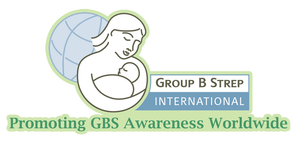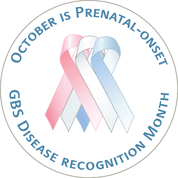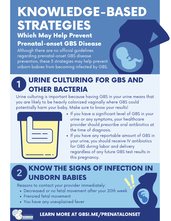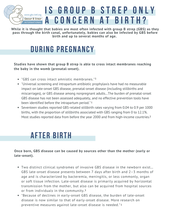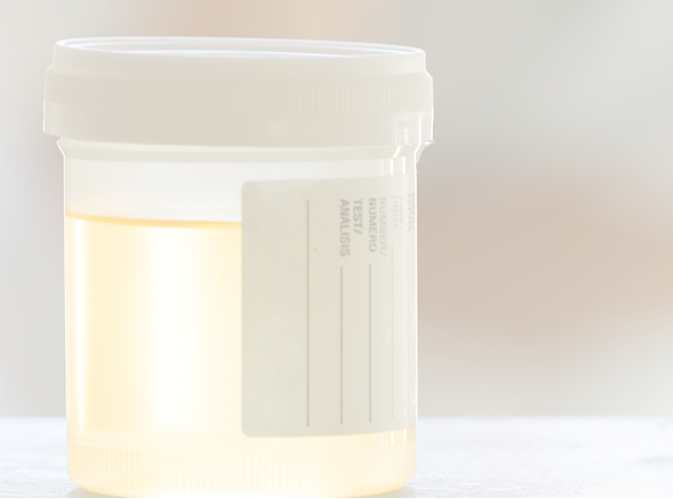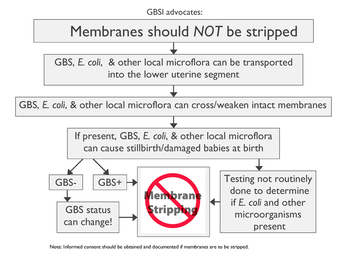|
What is prenatal-onset GBS?
Prenatal-onset Group B Strep Disease (POGBSD) occurs before labor and delivery and includes miscarriages and stillbirths caused by group B strep. POGBSD is invasive GBS disease (iGBS) that infects the baby in the womb before early-onset prevention protocols would be effective.
This type of GBS disease is often overlooked or not recognized, discounting the thousands of babies who have been lost or harmed by GBS before birth. We want to change that! |
Defining & Recognizing POGBSD
Currently, babies who are born already infected with group B strep are classified as "early-onset" regardless of when the infection began. According to a 2012 study done by Tudela and colleagues, "We hypothesize that these data support the concept that early-onset GBS represents a spectrum of infection that often precedes birth."
GBSI advocates that the timing of when the infection began should determine if a baby had early-onset vs. prenatal-onset GBS disease. This is important as early-onset prevention strategies don't prevent GBS infections beginning before labor starts or water breaking. In looking at individual cases, did the early-onset strategy fail or could something different have been done to protect a particular baby?
Please view Defining Prenatal-onset Group B Strep Disease (POGBSD) for further information.
Healthcare providers: Please view Table 1 of Development of Putative Working Definitions of Prenatal-onset Group B Strep (POGBS) Invasive Disease for proposed working definitions for POGBSD.
Over a decade ago, the US Centers for Disease Control & Prevention (CDC) stated in their 2010 MMWR, "The burden of prenatal-onset GBS disease has not been assessed adequately and no effective prevention tools have been identified before the intrapartum period." Since then, there have been several studies to assess the global burden of group B strep disease, including the burden of GBS infections prior to birth. Most recently, the World Health Organization (WHO) estimated in their November 2021 Group B Streptococcus Full Value of Vaccine Assessment that each year 518,000 preterm births were attributable to group B strep as well as 46,000 stillbirths, contrary to the the common thought that GBS-caused stillbirths are rare. This report calls for the urgent development of a maternal vaccine against GBS to reduce this toll. (Several vaccines are being developed; however, none are yet available.)
We are grateful to the authors of "The urgent need to recognize and properly address prenatal-onset group B Streptococcus disease" for their work to bring attention to POGBSD!
GBSI advocates that the timing of when the infection began should determine if a baby had early-onset vs. prenatal-onset GBS disease. This is important as early-onset prevention strategies don't prevent GBS infections beginning before labor starts or water breaking. In looking at individual cases, did the early-onset strategy fail or could something different have been done to protect a particular baby?
Please view Defining Prenatal-onset Group B Strep Disease (POGBSD) for further information.
Healthcare providers: Please view Table 1 of Development of Putative Working Definitions of Prenatal-onset Group B Strep (POGBS) Invasive Disease for proposed working definitions for POGBSD.
Over a decade ago, the US Centers for Disease Control & Prevention (CDC) stated in their 2010 MMWR, "The burden of prenatal-onset GBS disease has not been assessed adequately and no effective prevention tools have been identified before the intrapartum period." Since then, there have been several studies to assess the global burden of group B strep disease, including the burden of GBS infections prior to birth. Most recently, the World Health Organization (WHO) estimated in their November 2021 Group B Streptococcus Full Value of Vaccine Assessment that each year 518,000 preterm births were attributable to group B strep as well as 46,000 stillbirths, contrary to the the common thought that GBS-caused stillbirths are rare. This report calls for the urgent development of a maternal vaccine against GBS to reduce this toll. (Several vaccines are being developed; however, none are yet available.)
We are grateful to the authors of "The urgent need to recognize and properly address prenatal-onset group B Streptococcus disease" for their work to bring attention to POGBSD!
Knowledge-based Prevention Strategies:
Although there are currently no official guidelines regarding invasive prenatal-onset GBS disease prevention, the following are several knowledge-based strategies which may help prevent unborn babies becoming infected by group B strep (or other harmful microorganisms) and/or enable better outcomes with prompt medical intervention:
Resources:
View our past Symposium on POGBSD
In the US, this is usually done at the first prenatal visit and is different than the standard prenatal urine “dipstick” check. The American College of Obstetricians and Gynecologists (ACOG) issued new guidance in 2019 regarding Bacteriuria (GBS in urine) in regards to early-onset disease prevention. However, studies have shown that treating asymptomatic bacteriuria can reduce the risks of preterm birth. Further research is needed to see if perhaps urine culturing can also provide opportunities to reduce the risk of GBS infection for unborn babies.
Urine culturing is important because having GBS in your urine means that you are likely to be heavily colonized vaginally where GBS could potentially harm your baby. You may have GBS in your urine without having any symptoms, but see your provider promptly if you do have any symptoms of a bladder (urinary tract) infection.
Urine culturing is important because having GBS in your urine means that you are likely to be heavily colonized vaginally where GBS could potentially harm your baby. You may have GBS in your urine without having any symptoms, but see your provider promptly if you do have any symptoms of a bladder (urinary tract) infection.
|
Ask about the results of your urine culture:
|
|
As there are currently not any prevention protocols in place for prenatal-onset and although there may not be any detectable forewarning, knowing and recognizing these signs could make all the difference for you and your baby! Reasons to contact your provider immediately:
Fetal movement resource in English and French |
For more information regarding fetal movement view:
Monitoring fetal movement in the third trimester Joy Bryant, RN-C, BSN, MSN, EdD This presentation is from GBSI's 1st Annual Virtual Symposium on Prenatal-onset Group B Strep Disease. |
|
Fetal movements are a viable way to monitor your baby in utero. It is commonly thought that as a baby gets bigger and has less space in the womb, they move less. This is false. A baby's movement may feel different, but it should not lessen. If you notice a decrease in fetal movement, contact your care provider immediately.
Kick counting is a great was to bond with your baby and learning their routine can help empower you as a mother to act if there is a concern. |
Kjenn liv - in English from LUB on Vimeo. |
One study has found that fetal movements in utero are an expression of fetal well-being. However, a sudden increase of fetal movements is a sign of acute fetal distress. Decreased fetal movements are seen in cases of chronic fetal distress. It was shown that in these cases a pronounced decrease up to cessation of fetal movements occurred before fetal death in utero while fetal heart beats were still audible for at least 12 hours. This situation was called "movements alarm signal" (MAS). This sign points to a severely disturbed fetus and indicates impending intrauterine fetal death. Such a development is an indication for immediate delivery of the fetus, provided it is viable. High-risk pregnant women are instructed to assess and record fetal movements daily as a monitor of fetal condition.
|
Call your health care provider right away if you experience any of the following:
|
GBS as a Cause of Preterm Labor & (P)PROM
David M. Aronoff, MD, FIDSA, FAAM from GBSI's 1st Annual Virtual Symposium on Prenatal-onset Group B Strep Disease. |
GBS can cause preterm labor as well as cause an individual's water to break too soon, also known as preterm premature rupture of membranes (PPROM). While GBS can cause preterm labor and PPROM, it is important to note that it does not necessarily mean your baby will become infected.
According to an article on the global burden of GBS disease in 2015, "Up to 3.5 million preterm births may be attributable to GBS" each year. Being born too soon can cause lifelong health challenges for a baby.
View studies on preterm birth.
According to an article on the global burden of GBS disease in 2015, "Up to 3.5 million preterm births may be attributable to GBS" each year. Being born too soon can cause lifelong health challenges for a baby.
View studies on preterm birth.
Learn more about the many types of prenatal infections and how to help prevent them!
Invasive procedures may push GBS closer to your baby where GBS is able to cross intact membranes. Knowing how far you are dilated does not accurately predict when your baby will be born. Vaginal or perineal ultrasounds are less invasive options for internal exams although may not be readily available in all health care settings.
According to the current ACOG guidelines in the US, "Membrane sweeping (or stripping) among individuals with term gestations is associated with reduced duration of pregnancy and reduced frequency of pregnancy continuing beyond 41 weeks of gestation... Although current evidence is limited, membrane sweeping does not appear to be associated with adverse outcomes in pregnant individuals colonized with GBS..." however, .."Because of the hypothetical concern of bacterial seeding during the procedure, some practitioners may choose not to sweep the membranes in women colonized with GBS."
GBSI advocates informed patient consent regardless of GBS status as GBS status can change and other microorganisms can also cross intact membranes.
GBSI advocates informed patient consent regardless of GBS status as GBS status can change and other microorganisms can also cross intact membranes.
|
|
“Do Not Strip Membranes in the Presence of Group B Strep and Here’s Why” by Dr. James A. McGregor. This video contains ultrasound footage illustrating active uterine transport in both a non-pregnant and pregnant patient.
Video testimonials by providers as to why they avoid stripping membranes: |
GBSI’s poster “Membranes should NOT be stripped” below (en español) explains why GBSI advocates that membranes should NOT be stripped even if an individual tests negative for GBS. It is important to know that E. coli and other local microflora can also cross/weaken intact membranes.
|
GBSI advocates for informed consent prior to membrane stripping. Click HERE for our sample Learning Consent Form
On page 7 of the 201o CDC MMWR, the CDC discusses GBS and its ability to cross intact amniotic membranes.
“GBSI’s Information Statement on Fetal Membrane Stripping” (en español) (en français) explains why membrane stripping (or “sweeping”) should be avoided.
|
GBS can cause vaginitis symptoms such as:
These symptoms may be mistaken for a yeast infection (also known as "vaginal thrush") and treated incorrectly.
Healthcare providers: Please view the poster presentation, Revisiting group B strep (GBS) symptomatic vaginitis (GBSSV), for more information.
View studies about Vaginitis & GBS
- external vaginal burning
- external vaginal irritation
- unusual discharge
These symptoms may be mistaken for a yeast infection (also known as "vaginal thrush") and treated incorrectly.
Healthcare providers: Please view the poster presentation, Revisiting group B strep (GBS) symptomatic vaginitis (GBSSV), for more information.
View studies about Vaginitis & GBS
Join the Campaign against GBS Disease in babies! |
CONNECT TO GBSI |
